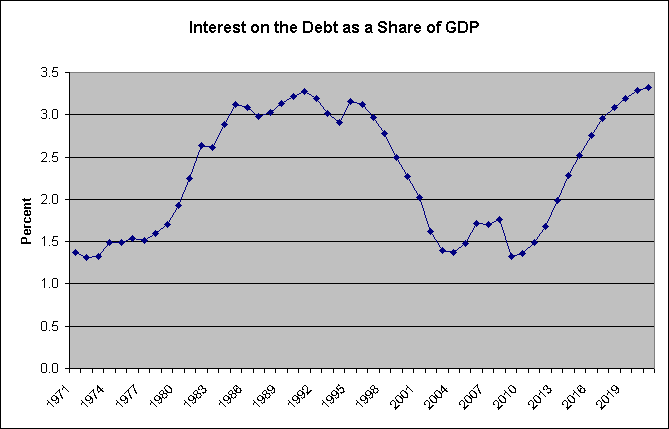haha
Give me a museum and I'll fill it. (Picasso) Give me a forum ...
Economists Ken Rogoff and Carmen Reinhart researched what they call eight centuries of financial folly and published their exhaustive results in This Time It's Different.
http://www.amazon.com/This-Time-Different-Centuries-Financial/dp/0691152640/ref=sr_1_1?ie=UTF8&qid=1360523381&sr=8-1&keywords=this+time+it%27s+different
Reading and remembering much of this is a real job, but one thing that seemed to stand out is that for many countries, at many different times, a 90% ratio of public debt to GDP has proven to strongly and negatively impact economic growth rates.
US public debt to GDP maxed out at 112% in 1945, after increasing rapidly during the depression and especially during WW2.
By 1974 it had been brought down to slightly less than 25%. Since it has been up and down; in the late 80s and early 90s there was even talk of paying it off completely. I remember earnest worries about how the world would be able to survive without US treasuries to invest in.
Anyway, no worries about that any longer, as the debt has mushroomed during the 21st century with no slowdown in sight so far.
So what are our chances of bringing this ratio rapidly down? My guess is less than nil. Coming out of WW2 the US had the only industrial plant of consequence still standing. We had bombed the enemy's plant to dust, and Britain was exhausted and the USSR far from being a commercial rival. So that, combined with excellent cooperative US politics in the postwar period allowed us to rapidly pay down the war debt.
Next question, is this perhaps finally the time that it will turn out to be different, and the special magic that some people attribute to the United States again pull some rabbit out of the hat so that we can continue blithely along with no meaningful ill consequences?
Ha

http://www.amazon.com/This-Time-Different-Centuries-Financial/dp/0691152640/ref=sr_1_1?ie=UTF8&qid=1360523381&sr=8-1&keywords=this+time+it%27s+different
Reading and remembering much of this is a real job, but one thing that seemed to stand out is that for many countries, at many different times, a 90% ratio of public debt to GDP has proven to strongly and negatively impact economic growth rates.
US public debt to GDP maxed out at 112% in 1945, after increasing rapidly during the depression and especially during WW2.
By 1974 it had been brought down to slightly less than 25%. Since it has been up and down; in the late 80s and early 90s there was even talk of paying it off completely. I remember earnest worries about how the world would be able to survive without US treasuries to invest in.
Anyway, no worries about that any longer, as the debt has mushroomed during the 21st century with no slowdown in sight so far.
So what are our chances of bringing this ratio rapidly down? My guess is less than nil. Coming out of WW2 the US had the only industrial plant of consequence still standing. We had bombed the enemy's plant to dust, and Britain was exhausted and the USSR far from being a commercial rival. So that, combined with excellent cooperative US politics in the postwar period allowed us to rapidly pay down the war debt.
Next question, is this perhaps finally the time that it will turn out to be different, and the special magic that some people attribute to the United States again pull some rabbit out of the hat so that we can continue blithely along with no meaningful ill consequences?
Ha

Last edited:



